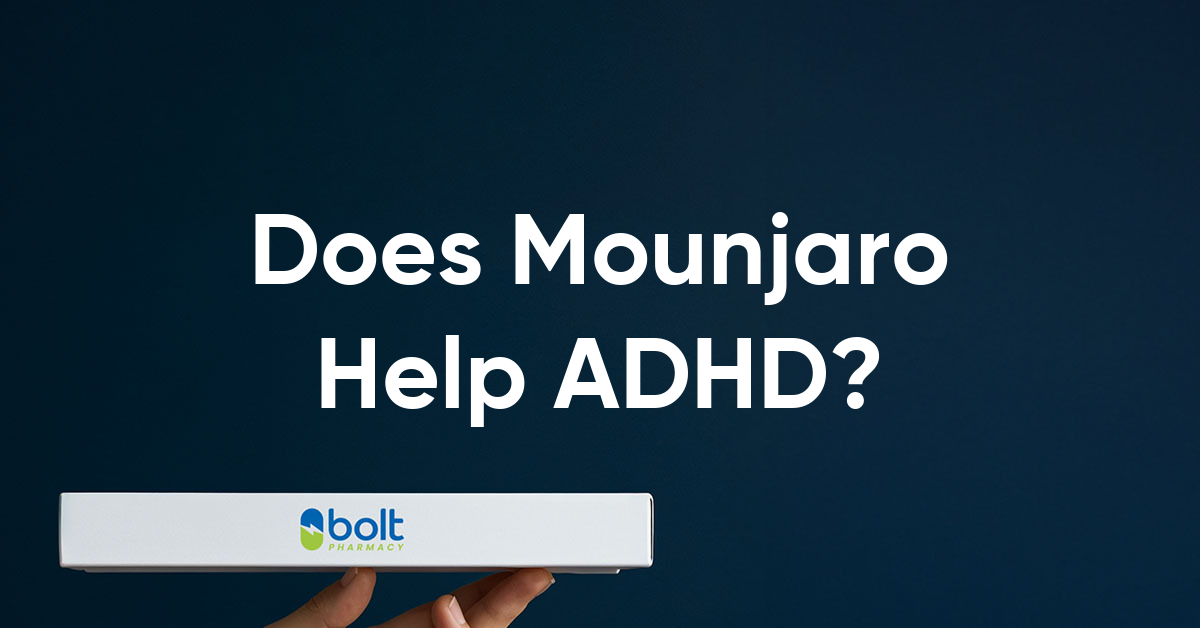Mounjaro (tirzepatide) is a prescription medicine licensed in the UK for type 2 diabetes and weight management in eligible adults. It works by activating incretin hormone receptors to regulate blood glucose and reduce appetite. Attention deficit hyperactivity disorder (ADHD) is a neurodevelopmental condition affecting dopamine and noradrenaline pathways in the brain. There is no established link between Mounjaro and ADHD treatment. This article examines whether Mounjaro helps ADHD, explores the evidence, and outlines safe, NICE-recommended treatments for ADHD available through the NHS.
Summary: Mounjaro (tirzepatide) is not licensed or indicated for ADHD treatment and has no established efficacy for neuropsychiatric conditions.
- Mounjaro is a dual GIP/GLP-1 receptor agonist licensed in the UK for type 2 diabetes and weight management, not ADHD.
- ADHD involves dopamine and noradrenaline dysregulation; Mounjaro acts on incretin hormone receptors unrelated to these neurotransmitter systems.
- Off-label use of Mounjaro for ADHD exposes patients to gastrointestinal side effects and rare serious risks without proven therapeutic benefit.
- NICE-recommended ADHD treatments include methylphenidate, lisdexamfetamine, atomoxetine, and psychological interventions with established efficacy.
- Patients with ADHD symptoms should seek NHS specialist assessment for access to licensed, evidence-based treatments with proven safety profiles.
Table of Contents
What Is Mounjaro and How Does It Work?
Mounjaro (tirzepatide) is a prescription medicine licensed in the UK for the treatment of type 2 diabetes mellitus and, more recently, for weight management in adults with obesity or overweight with weight-related comorbidities. For weight management, NICE recommends tirzepatide only for eligible adults within specialist weight management services. It is administered as a once-weekly subcutaneous injection and belongs to a novel class of medications known as dual glucose-dependent insulinotropic polypeptide (GIP) and glucagon-like peptide-1 (GLP-1) receptor agonists.
The mechanism of action of Mounjaro involves mimicking two naturally occurring incretin hormones that play crucial roles in glucose regulation and appetite control. By activating both GIP and GLP-1 receptors, tirzepatide enhances insulin secretion in a glucose-dependent manner, suppresses inappropriate glucagon release, slows gastric emptying, and reduces appetite. These combined effects lead to improved glycaemic control in people with type 2 diabetes and significant weight loss in those using it for weight management.
Key pharmacological effects include:
-
Enhanced insulin secretion when blood glucose levels are elevated
-
Reduced glucagon secretion, which decreases hepatic glucose production
-
Delayed gastric emptying, promoting satiety
-
Direct effects on appetite centres in the brain
Mounjaro is available in the UK through NHS prescription for eligible patients meeting specific clinical criteria, as outlined by NICE guidance. Common adverse effects include gastrointestinal symptoms such as nausea, vomiting, diarrhoea, and constipation, which typically diminish over time. More serious but rare risks include pancreatitis and gallbladder disease. Hypoglycaemia is primarily a risk when used with insulin or sulfonylureas, and dose adjustments of these medications may be needed. It is important to note that Mounjaro is not licensed or indicated for the treatment of attention deficit hyperactivity disorder (ADHD) or any neuropsychiatric condition.

Understanding ADHD and Current Treatment Options
Attention deficit hyperactivity disorder (ADHD) is a neurodevelopmental condition characterised by persistent patterns of inattention, hyperactivity, and impulsivity that interfere with daily functioning and development. ADHD typically begins in childhood but often continues into adulthood, affecting approximately 3-4% of adults in the UK. The condition has a strong neurobiological basis, involving dysregulation of neurotransmitter systems, particularly dopamine and noradrenaline pathways in the prefrontal cortex and other brain regions responsible for executive function.
Diagnosis of ADHD in the UK follows NICE guidelines (NG87), which recommend a comprehensive clinical assessment by specialists experienced in diagnosing and managing the condition. This assessment includes detailed developmental history, observation of symptoms across multiple settings, and exclusion of other conditions that may present similarly. Rating scales and collateral information from family members, teachers, or colleagues often supplement the clinical evaluation.
NICE-recommended treatment approaches for ADHD include:
Non-pharmacological interventions:
-
Psychoeducation for patients and families
-
Environmental modifications to support attention and organisation
-
Cognitive behavioural therapy (CBT) for adults
-
Parent training programmes for children
Pharmacological treatments:
-
Stimulant medications: methylphenidate (first-line) and lisdexamfetamine
-
Non-stimulant medications: atomoxetine and guanfacine
These medications work by modulating dopamine and noradrenaline neurotransmission in the brain, directly addressing the neurochemical imbalances underlying ADHD symptoms. Before starting stimulant therapy, a baseline cardiovascular assessment including blood pressure and pulse is recommended, with ongoing monitoring during treatment. Treatment decisions are individualised based on symptom severity, comorbidities, patient preference, and response to previous interventions. There is no official link between Mounjaro's mechanism of action and the neurotransmitter systems involved in ADHD pathophysiology.
Potential Risks of Using Mounjaro for ADHD
Using Mounjaro for ADHD would constitute off-label use, as there is no official link established between this medication and ADHD treatment, nor is there robust clinical evidence supporting its efficacy for neuropsychiatric conditions. Off-label prescribing carries inherent risks, particularly when the medication's mechanism of action does not target the underlying pathophysiology of the condition being treated. In the case of ADHD, the core neurochemical dysfunction involves dopamine and noradrenaline systems, whereas Mounjaro acts primarily on incretin hormone receptors related to glucose metabolism and appetite regulation.
Specific concerns regarding off-label use of Mounjaro for ADHD include:
Lack of efficacy: Without evidence demonstrating benefit for ADHD symptoms, patients may experience delayed access to proven treatments whilst experiencing no improvement in attention, hyperactivity, or impulsivity. This delay could significantly impact academic performance, occupational functioning, and quality of life.
Adverse effects without therapeutic benefit: Patients would be exposed to Mounjaro's known side effects—including nausea, vomiting, diarrhoea, abdominal pain, and rare but serious risks such as pancreatitis and gallbladder disease—without receiving any established benefit for their ADHD symptoms. C-cell thyroid tumours have been observed in rodent studies, though the relevance to humans is unknown.
Financial implications: Mounjaro is an expensive medication. Using it for an unlicensed indication would not be covered by NHS funding, potentially creating significant out-of-pocket costs for patients seeking private prescriptions.
Missed diagnosis or comorbidities: Some individuals seeking Mounjaro for ADHD may have undiagnosed conditions that could be better addressed with appropriate investigation and treatment. For example, obesity and ADHD can co-occur, but each requires specific, evidence-based management.
Patients considering any off-label medication use should discuss the risks and benefits thoroughly with their GP or specialist. If you have concerns about ADHD symptoms, seeking assessment through proper NHS channels ensures access to licensed, effective treatments with established safety profiles. If you experience any suspected side effects from medications, report them via the MHRA Yellow Card scheme (yellowcard.mhra.gov.uk).
Evidence-Based ADHD Treatments Available in the UK
The UK benefits from comprehensive NICE guidance (NG87) that provides clear, evidence-based recommendations for ADHD management across the lifespan. These treatments have undergone rigorous clinical trials demonstrating both efficacy and safety, and they directly target the neurobiological mechanisms underlying ADHD.
First-line pharmacological treatments for ADHD in the UK include stimulant medications, which have the strongest evidence base. Methylphenidate is typically the first choice for children, adolescents, and adults. It works by blocking the reuptake of dopamine and noradrenaline, increasing their availability in the synaptic cleft. Formulations include short-acting (requiring multiple daily doses) and modified-release preparations (once-daily dosing) to suit individual needs. Lisdexamfetamine is another stimulant option, particularly useful when methylphenidate is ineffective or poorly tolerated. It is a prodrug that is converted to active dexamfetamine in the body, providing smooth, sustained symptom control.
Non-stimulant medications offer alternatives for patients who cannot tolerate stimulants or have contraindications such as cardiovascular disease, tics, or substance misuse concerns. Atomoxetine is a selective noradrenaline reuptake inhibitor that improves ADHD symptoms through noradrenergic modulation. Guanfacine is an alpha-2 adrenergic agonist licensed for children and adolescents when stimulants are unsuitable.
Psychological interventions form an essential component of comprehensive ADHD management. For adults, CBT adapted for ADHD can help develop coping strategies for organisation, time management, and emotional regulation. For children, parent training programmes and school-based interventions provide crucial environmental support.
When to seek help: If you suspect you or your child has ADHD, contact your GP for referral to specialist services. Warning signs requiring urgent attention include severe functional impairment, risk-taking behaviour, significant emotional distress, self-harm, suicidal thoughts, or severe aggression. Contact your GP urgently, NHS 111, or 999/A&E if there is immediate risk of harm. NHS waiting times for ADHD assessment vary by region, but in England, Right to Choose provisions may offer faster access to diagnosis through approved alternative providers. Never attempt to self-medicate with unlicensed treatments—evidence-based care through proper NHS channels ensures the safest and most effective outcomes.
Frequently Asked Questions
Is Mounjaro approved for treating ADHD in the UK?
No, Mounjaro (tirzepatide) is not licensed or approved for ADHD treatment in the UK. It is only indicated for type 2 diabetes and weight management in eligible adults, and there is no clinical evidence supporting its use for neuropsychiatric conditions.
What are the first-line treatments for ADHD recommended by NICE?
NICE recommends methylphenidate as the first-line pharmacological treatment for ADHD in children, adolescents, and adults. Lisdexamfetamine is an alternative stimulant, whilst atomoxetine and guanfacine are non-stimulant options for those who cannot tolerate stimulants or have contraindications.
What are the risks of using Mounjaro off-label for ADHD?
Using Mounjaro off-label for ADHD exposes patients to gastrointestinal side effects and rare serious risks such as pancreatitis without any proven benefit for ADHD symptoms. This delays access to evidence-based treatments and may incur significant costs, as off-label use is not NHS-funded.
The health-related content published on this site is based on credible scientific sources and is periodically reviewed to ensure accuracy and relevance. Although we aim to reflect the most current medical knowledge, the material is meant for general education and awareness only.
The information on this site is not a substitute for professional medical advice. For any health concerns, please speak with a qualified medical professional. By using this information, you acknowledge responsibility for any decisions made and understand we are not liable for any consequences that may result.
Heading 1
Heading 2
Heading 3
Heading 4
Heading 5
Heading 6
Lorem ipsum dolor sit amet, consectetur adipiscing elit, sed do eiusmod tempor incididunt ut labore et dolore magna aliqua. Ut enim ad minim veniam, quis nostrud exercitation ullamco laboris nisi ut aliquip ex ea commodo consequat. Duis aute irure dolor in reprehenderit in voluptate velit esse cillum dolore eu fugiat nulla pariatur.
Block quote
Ordered list
- Item 1
- Item 2
- Item 3
Unordered list
- Item A
- Item B
- Item C
Bold text
Emphasis
Superscript
Subscript












